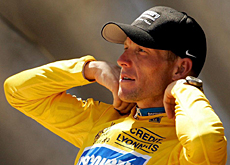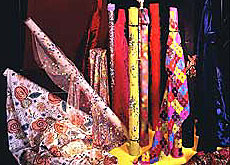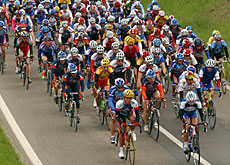Swiss textiles protect Tour de France riders

Seven-times Tour de France winner Lance Armstrong and other riders in the peloton were probably unaware they were wearing textiles "made in Switzerland".
They had far more pressing thoughts on their minds as they pedalled around France, chasing the title of champion in cycling’s most prestigious event.
But the textile that went into the yellow jersey that Armstrong wore practically throughout this year’s race comes from the Christian Eschler company in Bühler, canton Appenzell Outer Rhodes.
“Our speciality is that we produce a functional fabric. It can tackle moisture, block wind, rain or ultra-violet rays or is anti anti-microbiological, meaning that no bacteria can grow on the textile,” Martin Lüchinger from the company’s marketing department told swissinfo.
He is not sure exactly who else on the tour was wearing clothing made from Eschler’s fabric.
“We have a customer in Italy and he is a sponsor of several of the teams participating. Nike is also a customer and it produces [clothing] for the Discovery Channel team which includes Lance Armstrong,” Lüchinger said.
Other sportswear
The company’s textiles are not only used for making cycling apparel, but are also found in other sportswear, including skiing, athletics, golf and luge.
They are also being used in various job uniforms as well as in high-fashion lingerie.
Eschler, which was founded in 1927, made a name for itself in the 1960s when it began production of so-called “fish-skin” ski suits for the sport’s elite. Although not accepted at first by the International Ski Federation (FIS), the fabric soon caught on.
At the beginning of the 1970s, Eschler entered a cooperation agreement with the Japanese sport-clothing firm Descente and at the 1972 Winter Olympics in Sapporo some of the downhill racers were wearing three-layer ski suits.
Now all national ski teams that take part in FIS competitions use suits made with Eschler fabric.
“Quite proud”
“We are quite proud of course. However, we need to sell and the [professional] sports market is not that big for us. So we are trying to build a bridge between what the professional wear and the textiles that the general public buy in sports shops,” Lüchinger explained.
He said that about 50 per cent of turnover is in sports, while the remainder is in sales of fabrics for lingerie and workwear.
Eschler is perhaps typical of many Swiss textile companies around the St Gallen area that are fighting for a niche in a global textile market that is full of fierce competition.
“In the Swiss textile market, if you want to survive you have to be innovative and flexible. Part of our success is that we provide a full range of textiles, from the first layer that is next to the skin to the layer that provides you with protection from the wind and weather,” Lüchinger explained.
“Customers can get all they need from us and they can buy in small quantities. We are small enough to survive but big enough to be important in the market,” he added.
Temptation resisted
At a time when many manufacturing companies are looking towards China to relocate production and reduce costs, Eschler has resisted the temptation.
It already has facilities in Thailand (lingerie) and Germany. Earlier this year the company’s management head, Peter Eschler, made it clear that the company would “continue to hold firmly” on to Europe as a location.
“It’s a decision of the board and Peter Eschler. We are more flexible here and the know-how is here too. People still like the ‘made in Switzerland’ logo,” said Lüchinger.
swissinfo, Robert Brookes
The Tour de France comprises 21 stages and covers a distance of 3,607 kilometres.
The stages have the following profiles:
9 flat stages
3 medium mountain stages
6 mountain stages
2 individual time-trial stages
1 team-time trial stage
The Christian Eschler company, founded in 1927, makes high-tech fabric for customers including Nike, Descente, Spyder, Rossignol and Canondale.
Its headquarters are in Bühler in canton Appenzell Outer Rhodes, with a plant at Münchwilen in canton Thurgau.
Eschler employs about 230 people and had sales in 2004 of around SFr45 million ($35.13 million).

In compliance with the JTI standards
More: SWI swissinfo.ch certified by the Journalism Trust Initiative


You can find an overview of ongoing debates with our journalists here. Please join us!
If you want to start a conversation about a topic raised in this article or want to report factual errors, email us at english@swissinfo.ch.